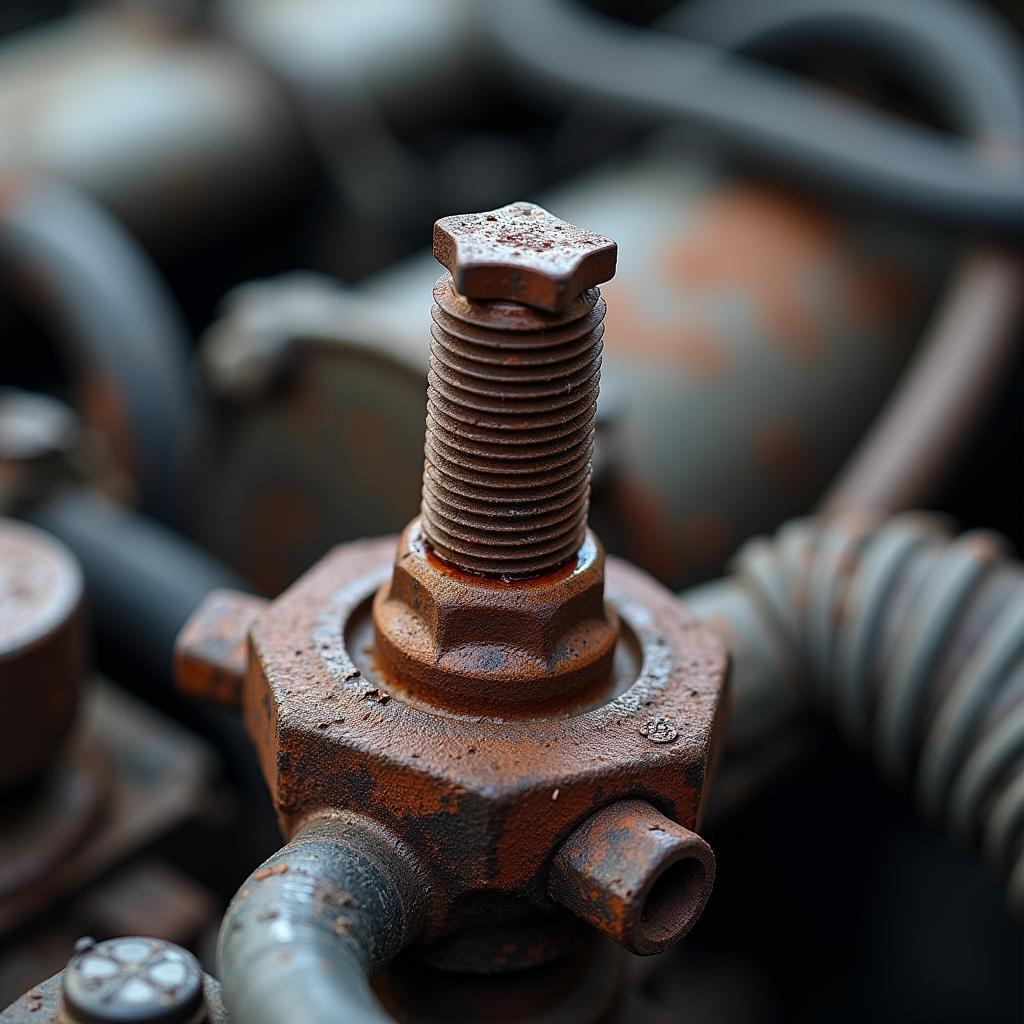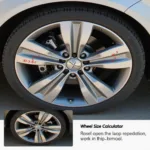Rust on screws is a ubiquitous problem that affects both DIYers and professional mechanics. We’ve all experienced it: you try to loosen a screw, but it’s seized, rusted, and about to snap. This article addresses the question “which screws won’t rust?” and provides comprehensive information on rust-resistant screws, their properties, and applications in car repair. We will cover various materials, coatings, and tips for preventing rust.
But why do screws rust at all? Rust occurs through the reaction of iron with oxygen and water. This corrosion process weakens the metal and can, in the worst case, lead to the failure of the screw. Imagine a crucial screw on the engine block rusting through – that can have serious consequences! Therefore, choosing the right screws, especially in the automotive field, is crucial. Spraying can help prevent rust.
 Rusted screw on the engine block – Danger for the engine
Rusted screw on the engine block – Danger for the engine
Rust-Resistant Screws: Materials and Properties
The answer to the question “which screws won’t rust?” is simple: screws made from rust-resistant materials. But what exactly does “rust-resistant” mean? There are various alloys that offer high resistance to corrosion. The most common are stainless steel, brass, and titanium.
Stainless steel is the classic among rust-resistant materials. It contains chromium, which forms a protective passive layer on the surface, preventing corrosion. There are different grades of stainless steel that vary in their composition and properties. For the automotive sector, grades A2 and A4 are particularly suitable. According to Dr. Klaus Müller, author of the book “Rust-Resistant Connections in the Automotive Industry,” choosing the right stainless steel is crucial for the longevity of the connection.
Brass is a copper-zinc alloy that also has good corrosion resistance. Brass screws are often found in areas with high humidity or in maritime environments. However, they are less load-bearing than stainless steel screws and are therefore better suited for less stressed connections.
Titanium is an extremely light yet very strong material with excellent corrosion resistance. Titanium screws are often used in motorsport and high-end vehicles because they offer high strength at low weight. The disadvantage: titanium is significantly more expensive than stainless steel or brass.
Coatings for Additional Protection
In addition to choosing the right material, coatings can also improve the corrosion protection of screws. Galvanized screws are a cost-effective alternative to stainless steel screws. The zinc layer protects the underlying iron from rust. Removing Rust from Alloy Wheels is also an important topic when it comes to corrosion protection.
Tips for Preventing Rust
Even when using rust-resistant screws, there are a few points to consider to prevent corrosion:
- Always use the correct screw size and torque.
- Avoid galvanic corrosion by combining different metals.
- Use lubricants or corrosion inhibitors as needed.
- Clean the screws regularly.
- Check the screws regularly for signs of rust.
Which Screws Resist Rust in Car Repair?
In car repair, rust-resistant screws play a crucial role. From the bodywork to the engine and the braking system – screws are used everywhere that must withstand the stresses of driving. Choosing the right screws is therefore essential for the safety and reliability of the vehicle. For example, repairing a swollen door may require rust-resistant screws.
Further Questions About Rust-Resistant Screws
- Which stainless steel grades are suitable for which applications in the automotive sector?
- How can you remove rust from existing screws?
- What alternatives are there to rust-resistant screws?
- Where can you buy high-quality rust-resistant screws?
Visit our website autorepairaid.com for more information and helpful tips on car repair. Need VW Caddy Wheels? We have what you need!
Conclusion
Rust-resistant screws are essential for durable and secure connections in the automotive sector. Choosing the right material and coating is crucial to prevent corrosion. By following the tips mentioned, you can extend the lifespan of your screws and ensure the safety of your vehicle. Feel free to contact us if you have questions or need assistance selecting the right screws. Our experts are available 24/7.

